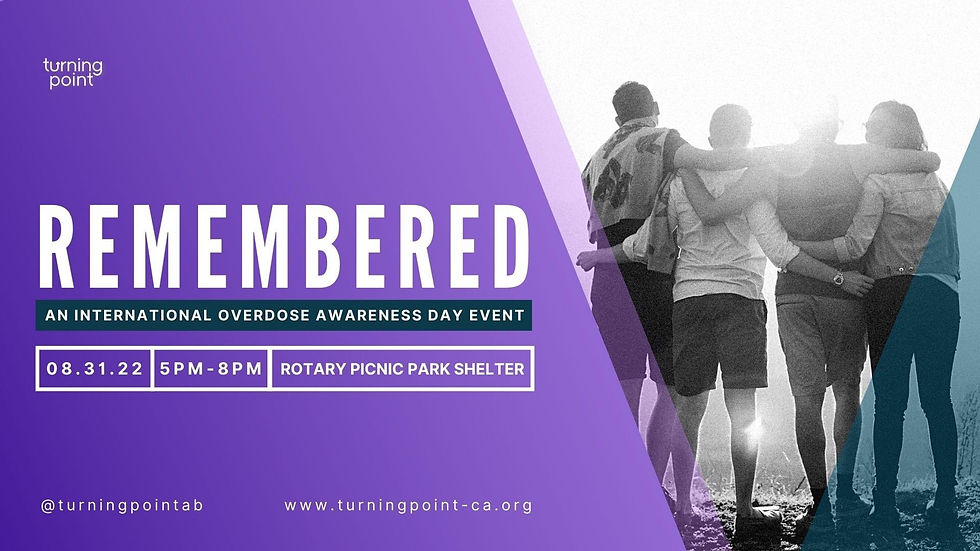Come As You Are: International Overdose Awareness Day 2022 (video)
- jimilee26
- Aug 30, 2022
- 2 min read
StettlerLocal.com August 30, 2022 @ 4:00pm

The drug poisoning crisis continues to escalate in Alberta. Tragically, yet predictably without meaningful urgent action, it has more than doubled in the last few years. As a result, Alberta lost approximately 1800 people in 2021 alone to a preventable cause of death. Parents, children, siblings, partners, friends and sometimes youth are dying of an unregulated and toxic supply of substances. Every year on August 31, we gather in solidarity on International Overdose Awareness Day to remember, mourn and reflect on what this crisis has taken from us.
Harm Reduction work connects us to many situations and people looking for support. Sadly it happens far too often that someone reaches out because they have lost a family member or close friend. This is a heartbreaking way to form bonds, but we recognize the deep need to continue doing so. Their loved ones were kind, funny, hard-working, thoughtful humans with talents, jobs, and families, not just numbers in a report. These losses leave ripples of grief and trauma, noticeably in smaller communities.
With no oversight on what is produced and sold by the illicit market, what used to be heroin or opioids is now a supply saturated by fentanyl and its analogues. Benzodiazepines and other adulterants are added into the concoction for various reasons, making a response to poisonings trickier. What people believe they are purchasing to consume while home with friends or at a social event is often not what they think it is. Thus we say ‘poisonings’. Tragedy can happen if people aren’t informed or using alone and cannot help themselves.
A toxic supply combined with cuts to Harm Reduction programming in Alberta has resulted in immense loss of life. Services that removed the stigma from drug use, built connections to workers and allowed people to consume in a supervised, hygienic way have been shuttered. Programs that medically dispensed pharmaceutical alternatives to the street supply and gave participants a vastly improved quality of life have been discontinued for new intakes. Outreach organizations struggle with underfunding, trying to meet the needs of those who need support. The impacts of such cuts and policy decisions go into detail across Canada in this award-winning film, with a sequel focused on Alberta’s fight for Harm Reduction coming soon.
Although poisonings happen at a more emergent rate and may be more visible in the urban centers, rural areas also report significantly higher deaths and calls for service to respond. We aim to build local partnerships to help prepare people such as business owners, County workers and volunteers (firefighters, Citizens on Patrol, etc.) who may be likely to reverse drug poisonings throughout Central Alberta. In addition, rural Outreach offers education opportunities for anyone interested and with experience training middle and high school students. It is vitally important for youth to be prepared to respond in an emergency and know how to use Naloxone to save a life. We also need to educate future adults and ensure they don’t lose as many loved ones as we are in 2022.
For more information https://turningpoint-ca.org/rural-outreach/

Jenn McCrindle, Rural Outreach



Comments